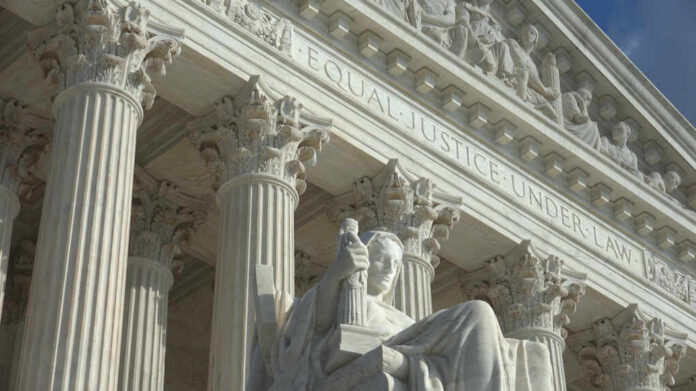
The Trump administration is rushing to the Supreme Court to reinstate deportations of Venezuelan gang members who recently staged a violent uprising in a Texas detention facility.
At a Glance
- Trump administration urges Supreme Court to allow deportation of 23 alleged Tren de Aragua gang members under the Alien Enemies Act
- The detainees barricaded themselves, covered surveillance cameras, and threatened to take hostages at the Bluebonnet Detention Facility
- DHS officials label the gang members as “foreign terrorists” who pose a serious threat to facility staff and other detainees
- Soros-linked groups sued to block the deportations, resulting in a temporary pause by the Supreme Court
The case, A.A.R.P. v. Trump, No. 24A1007, will determine if the administration can use the Alien Enemies Act for these deportations
Detention Facility Crisis Prompts Legal Action
The Department of Justice is seeking the Supreme Court’s permission to resume deportations of Venezuelan nationals identified as members of the notorious Tren de Aragua gang. This urgent request follows a dangerous incident at the Bluebonnet Detention Facility where 23 alleged gang members staged what officials describe as a coordinated uprising. According to court documents, the detainees barricaded themselves inside areas of the facility, covered surveillance cameras, and made explicit threats against staff and Immigration and Customs Enforcement (ICE) officers.
Joshua D. Johnson, acting ICE director for the Dallas office, detailed the severity of the situation in court filings. The detainees “threatened to take hostages and injure facility contract staff and ICE officers,” creating an immediate security risk that required emergency response protocols. Following the April 23 incident, authorities transferred the detainees to a different detention center under a more favorable court jurisdiction for the administration’s legal strategy.
JUST PUBLISHED: Venezuelans Threatened Hostage-Taking in ICE Detention. PULSE POINTS:
❓What Happened: A group of detained Venezuelan men in Texas barricaded themselves, covered cameras, and threatened to take hostages, according to U.S. Immigration and Customs Enforcement (ICE).…— The National Pulse (@TheNatPulse) May 14, 2025
DHS Labels Detainees as Security Threats
Department of Homeland Security officials have taken a firm stance on the danger posed by these detainees. In a strongly worded statement, DHS Assistant Secretary Tricia McLaughlin characterized the situation as a significant security concern. “Twenty-three TdA members barricaded themselves in the Bluebonnet Detention Facility, threatened to take hostages, and endangered officers,” McLaughlin stated. The administration’s position is that these individuals represent an ongoing threat that cannot be effectively managed within standard detention facilities.
“Keeping these foreign terrorists in ICE facilities poses a serious threat to ICE officers, staff, and other detainees. The media repeated these TdA gang members’ false sob stories, but the truth is these are members of a foreign terrorist organization that rape, maim, and murder for sport.”, said DHS Assistant Secretary Tricia McLaughlin.
The administration’s court filings cite the detention facility incident as clear evidence justifying deportation. However, conflicting narratives have emerged about the detainees’ circumstances. Drone footage captured at Bluebonnet showed some detainees spelling out “SOS” and holding signs requesting deportation to avoid potential imprisonment in El Salvador’s Terrorism Confinement Center, suggesting a more complex situation than government filings indicate.
Legal Battle Over Alien Enemies Act
President Trump’s administration faces significant legal challenges over its application of the Alien Enemies Act, a 226-year-old law originally designed for wartime circumstances. The President’s proclamation stated that “all Venezuelan citizens 14 years of age or older who are members of [Tren de Aragua], are within the United States, and are not actually naturalized or lawful permanent residents of the United States are liable to be apprehended, restrained, secured, and removed as Alien Enemies.”
Several organizations with reported connections to George Soros have filed lawsuits challenging these deportations, resulting in a temporary pause ordered by the Supreme Court. Critics argue the administration has not provided adequate notice or due process, potentially exposing deportees to severe consequences. The government has acknowledged that some previously deported Venezuelans had no criminal records and some possessed legal permission to be in the United States, further complicating the legal landscape.
Supreme Court Decision Pending
While the Supreme Court has permitted the use of the Alien Enemies Act, it has specified that detainees must have an opportunity to challenge claims against them in court. Multiple federal judges have questioned the administration’s interpretation of the law, particularly its application of terms like “war” and “invasion” to the current immigration situation. An intelligence memo cited in court proceedings denies any direct connection between Venezuela’s government and the Tren de Aragua gang, potentially undermining a key element of the administration’s legal argument.
The Supreme Court’s ruling in A.A.R.P. v. Trump, No. 24A1007, will determine whether the administration can continue with these deportations under the Alien Enemies Act. The case represents a critical test of executive authority in immigration enforcement and national security matters, with significant implications for both the detainees and the administration’s broader border security initiatives.

























